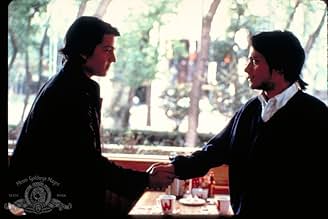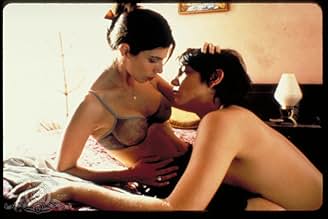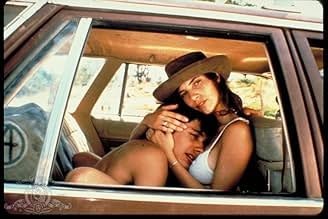In Mexico, two teenage boys and an older woman embark on a road trip and learn a thing or two about life and each other.In Mexico, two teenage boys and an older woman embark on a road trip and learn a thing or two about life and each other.In Mexico, two teenage boys and an older woman embark on a road trip and learn a thing or two about life and each other.
- Director
- Writers
- Stars
- Nominated for 1 Oscar
- 39 wins & 48 nominations total
Daniel Giménez Cacho
- Narrator
- (voice)
- Director
- Writers
- All cast & crew
- Production, box office & more at IMDbPro
Featured reviews
10jotix100
This is a very different Mexican film. One in which you can really appreciate the sure hand of director Alfonso Cuaron working at the top of his form with an excellent group of actors, which proves that when someone of this magnitude decides to make a good film about interesting characters in contemporary Mexico, one can expect a fine finished product.
Alfonso and Carlos Cuaron have created people and situations that are very believable. The script is fine. "Y tu mama tambien" is about awakening and about reaching maturity. It's a great Mexican Road movie done with a lot of care.
The Cuarons shows us a slice of life that could happen, not only in that country, but one that is universal. Producers and directors in Mexico should see this film and learn how to do future movies, even though the popular taste runs into the horrible soap operas, popular in Mexican TV. The Cuarons have turned out a magnificent script and have turned away from those popular melodramas that are a staple of the film industry of our neighbor to the South.
Gael Garcia Bernal, who was excellent in Amores Perros, here demonstrates once again what an actor can do, given the right scenario and obviously a lot of freedom to give life to Julio. Diego Luna is also very credible in his portrayal of the son of a rich man on the road to discover himself. Obviously, the underlying theme is that both like each other, but it never comes out, as they both are so closeted and think themselves of being straight in such a macho atmosphere.
Maribel Verdu plays the pivotal role of Luisa. She sees right through the boys, but has to play the part since they are the salvation from her miserable marriage. Here as in other Spanish films, she lets us know she is an actress who likes to take chances. This was the right vehicle for her and she takes advantage of a role that makes her outshine the rest of the cast.
One can only hope more interesting things coming from this director and Mexico's gain is our loss, as it's obvious Mr. Cuaron's incursion into American films have not been as satisfactory as his work here.
Alfonso and Carlos Cuaron have created people and situations that are very believable. The script is fine. "Y tu mama tambien" is about awakening and about reaching maturity. It's a great Mexican Road movie done with a lot of care.
The Cuarons shows us a slice of life that could happen, not only in that country, but one that is universal. Producers and directors in Mexico should see this film and learn how to do future movies, even though the popular taste runs into the horrible soap operas, popular in Mexican TV. The Cuarons have turned out a magnificent script and have turned away from those popular melodramas that are a staple of the film industry of our neighbor to the South.
Gael Garcia Bernal, who was excellent in Amores Perros, here demonstrates once again what an actor can do, given the right scenario and obviously a lot of freedom to give life to Julio. Diego Luna is also very credible in his portrayal of the son of a rich man on the road to discover himself. Obviously, the underlying theme is that both like each other, but it never comes out, as they both are so closeted and think themselves of being straight in such a macho atmosphere.
Maribel Verdu plays the pivotal role of Luisa. She sees right through the boys, but has to play the part since they are the salvation from her miserable marriage. Here as in other Spanish films, she lets us know she is an actress who likes to take chances. This was the right vehicle for her and she takes advantage of a role that makes her outshine the rest of the cast.
One can only hope more interesting things coming from this director and Mexico's gain is our loss, as it's obvious Mr. Cuaron's incursion into American films have not been as satisfactory as his work here.
After watching this movie, I looked at what a few critics had to say about it and I was shocked to see some of them refer to this movie as a "teen sex comedy". Wow, I didn't get that impression at all! Yes, the movie is infused with sex, and the two lead characters are horny teens, and there are quite a few comedic moments, but this is far from a teen sex comedy. It's treatment of the subject matter is real, for one thing, and backdrop of the Mexican countryside (and the director's detached observation's through third-person narration) bring some sobriety to the film. Be warned, though: there is a lot of sex, so not exactly a movie you're going to want to watch with the in-laws.
`Y tu Mama tambien,' a stunning new product of the New Mexican Cinema that is achieving crossover success in the American film market, is a frank, open and uninhibited celebration of teenage sex masterfully directed by Alfonso Cuaron and beautifully enacted by a trio of first-rate performers. Don't miss it provided you are not offended by sometimes-graphic depictions of sexual activity (please note that the film is unrated). The matter-of-fact, unflinching way in which Cuaron films his sex scenes purges them of indecency and helps to bring a new frankness to a subject all too often approached by American filmmakers from the angle of tittering exploitation (wherein the directors and writers seem as adolescent in their attitudes as the characters on the screen).
Not so here. The film centers around two boyhood chums, Tenoch and Julio, just embarking on their careers as university students, who, for one last glorious summer, decide to revel in all the wildness, hedonism and promiscuity that carefree adolescence has to offer (the title of the film is emblematic of the youthful immaturity of the characters). With their girlfriends away in Europe, the two decide to take a road trip through Mexico with Luisa, the attractive young wife of one of Tenoch's stuffed shirt cousins. While on the journey, the three of them not only indulge in all the bizarre sexual hijinks that both the situation and their hormones would lead one to expect, but they also learn a thing or two about life, about relationships and about how sex can be used both to bring people closer together as well as to pull them farther apart. For indeed, one thing the film makes very clear both to the characters and to us is that sex can often be employed as a weapon to wound those we care most about, especially with all the power shifting that takes place even in some of the most non-sexual of relationships. The boys also discover that sex can be used as a sublimation to avoid recognizing what one REALLY wants. This awakening leads to a final scene that is almost heartbreaking in its understated poignancy and pathos.
One of the most unsettling and thereby controversial aspects of the film (and the one that will make it uncomfortable for many in the audience) is that it refuses to take a moralistic stance regarding its characters' behavior. The filmmakers neither approve of nor condemn what these young people do they merely record the events with an attitude of detached objectivity that precludes any finger-wagging disapproval. If the characters learn any `lessons' from their experiences, they do so strictly on a subliminal, subconscious level and the same goes for the audience.
As a director, Cuaron displays a confidence and spirit rarely seen in filmmaking today. Along with his co-writer, Carlos Cuaron, the director has chosen to take an objective, almost documentary-style approach to the material, allowing the scenes to play themselves out in a way that makes them feel realistic, spontaneous and almost unscripted. He uses a shaky, handheld camera much of the time to enhance the immediacy of the experience. We often feel as if we are eavesdropping on the lives of these three fascinating individuals. As a result, not a single moment of the film feels forced, contrived or artificial. (Only the fate of one of the characters seems a bit convenient and contrived). Cuaron is not afraid to let the camera linger on a scene a moment two longer than necessary nor is he afraid to let the camera wander off on its own from time to time, such as when it spontaneously follows a woman into the back of a roadside café to show us the cooks hard at work in the kitchen. Many of the shots even have an elegiac, travelogue feel to them.
Cuaron has been blessed with three outstanding young actors Diego Luna, Gael Garcia and Maribel Verdu who bring his characters to vivid, endearing life. Utterly naturalistic in their every move, gesture and facial expression, the three of them play off each other in such a way that we never doubt for a moment the truth and sincerity of what we are seeing. American actors please take note!
`Y tu Mama tambien' is a stylistic triumph from first moment to last. It has a playful, expansive spirit, as reflected in its openhearted attitude towards sex, its wry humor, its affection for its people and its country, and its visual appeal and inventiveness (Emmanuel Lubezki did the glorious cinematography). The film has heart, soul and chutzpah. What more could a jaded filmgoer want?
Not so here. The film centers around two boyhood chums, Tenoch and Julio, just embarking on their careers as university students, who, for one last glorious summer, decide to revel in all the wildness, hedonism and promiscuity that carefree adolescence has to offer (the title of the film is emblematic of the youthful immaturity of the characters). With their girlfriends away in Europe, the two decide to take a road trip through Mexico with Luisa, the attractive young wife of one of Tenoch's stuffed shirt cousins. While on the journey, the three of them not only indulge in all the bizarre sexual hijinks that both the situation and their hormones would lead one to expect, but they also learn a thing or two about life, about relationships and about how sex can be used both to bring people closer together as well as to pull them farther apart. For indeed, one thing the film makes very clear both to the characters and to us is that sex can often be employed as a weapon to wound those we care most about, especially with all the power shifting that takes place even in some of the most non-sexual of relationships. The boys also discover that sex can be used as a sublimation to avoid recognizing what one REALLY wants. This awakening leads to a final scene that is almost heartbreaking in its understated poignancy and pathos.
One of the most unsettling and thereby controversial aspects of the film (and the one that will make it uncomfortable for many in the audience) is that it refuses to take a moralistic stance regarding its characters' behavior. The filmmakers neither approve of nor condemn what these young people do they merely record the events with an attitude of detached objectivity that precludes any finger-wagging disapproval. If the characters learn any `lessons' from their experiences, they do so strictly on a subliminal, subconscious level and the same goes for the audience.
As a director, Cuaron displays a confidence and spirit rarely seen in filmmaking today. Along with his co-writer, Carlos Cuaron, the director has chosen to take an objective, almost documentary-style approach to the material, allowing the scenes to play themselves out in a way that makes them feel realistic, spontaneous and almost unscripted. He uses a shaky, handheld camera much of the time to enhance the immediacy of the experience. We often feel as if we are eavesdropping on the lives of these three fascinating individuals. As a result, not a single moment of the film feels forced, contrived or artificial. (Only the fate of one of the characters seems a bit convenient and contrived). Cuaron is not afraid to let the camera linger on a scene a moment two longer than necessary nor is he afraid to let the camera wander off on its own from time to time, such as when it spontaneously follows a woman into the back of a roadside café to show us the cooks hard at work in the kitchen. Many of the shots even have an elegiac, travelogue feel to them.
Cuaron has been blessed with three outstanding young actors Diego Luna, Gael Garcia and Maribel Verdu who bring his characters to vivid, endearing life. Utterly naturalistic in their every move, gesture and facial expression, the three of them play off each other in such a way that we never doubt for a moment the truth and sincerity of what we are seeing. American actors please take note!
`Y tu Mama tambien' is a stylistic triumph from first moment to last. It has a playful, expansive spirit, as reflected in its openhearted attitude towards sex, its wry humor, its affection for its people and its country, and its visual appeal and inventiveness (Emmanuel Lubezki did the glorious cinematography). The film has heart, soul and chutzpah. What more could a jaded filmgoer want?
People don't get this movie..there is so much more the just coming of age and having sex. It is also about the social disparity in Mexico. That is what all the overdubs were for. Every time there was an voice-over something of meaning was said about the surroundings and the way the average Mexican lives. Don't think of this movie as a story about three people, think of it as a story about a whole nation. I encourage everyone to watch it again. Please pay attention to the scene in the boat. that almost makes me cry. It is so well worded also. And the way the voiceovers just cut abruptly is a great. There are so many small things about this movie that make it so much better then your average Hollywood movie.
From the recent comments on this film board, it's amazing how people can watch this film all the way through and at the end not have any idea what it was about.
This was quite simply one of the best films I've seen in recent years. Using three central characters -- two immature adolescent males and a young woman in crisis -- set in a road-trip situation, it was hardly a road-trip movie. Nor was it an adolescent movie. Nor was it a woman-in-crisis movie. Nor was it about sex. Instead, what starts out with a sizzling but ditzy prologue becomes something much deeper and much more profound as it goes along. By the end I was breathless and somewhat stunned. The character study is amazing. The societal insights are haunting. The shared humanity it exposes is painful at time but ultimately reaffirming and uplifting. These are three of the most memorable, identifiable and completely human characters I've seen on screen in ages. They taught me more about life and the human species than the last ten movies I've seen put together. I'll not soon forget Julio, Tenoch and Luisa and their eye-opening journey to Boca del Cielo.
This was quite simply one of the best films I've seen in recent years. Using three central characters -- two immature adolescent males and a young woman in crisis -- set in a road-trip situation, it was hardly a road-trip movie. Nor was it an adolescent movie. Nor was it a woman-in-crisis movie. Nor was it about sex. Instead, what starts out with a sizzling but ditzy prologue becomes something much deeper and much more profound as it goes along. By the end I was breathless and somewhat stunned. The character study is amazing. The societal insights are haunting. The shared humanity it exposes is painful at time but ultimately reaffirming and uplifting. These are three of the most memorable, identifiable and completely human characters I've seen on screen in ages. They taught me more about life and the human species than the last ten movies I've seen put together. I'll not soon forget Julio, Tenoch and Luisa and their eye-opening journey to Boca del Cielo.
Did you know
- TriviaAlfonso Cuarón did not want to cast Luna for the role of Tenoch because he was a teen idol and soap opera star. Bernal convinced Cuarón to hire Luna because their strong existing friendship would make the performance of their characters' friendship much easier. Cuarón ultimately hired Luna because he became convinced that their bond would produce a natural and honest performance.
- GoofsThe movie takes place in the summertime - we know this from the boys just having graduated, their girls going off to Europe, the weather, etc. Yet at the wedding near the beginning of the film, the narrator tells us that in a few days the president of Mexico will go to Seattle for the WTO conference - which happened in November.
- Alternate versionsSeveral scenes edited out of the final movie were made available for public viewing on the movie's official Web site. The director claims to have created multiple edits of this film to satisfy censorship rules around the world. According to the director, one of these edits, allegedly intended for Mexican distribution in protest of that country's heavy censorship, runs less than 10 minutes.
- ConnectionsEdited into Y tu mamá también: Deleted Scenes (2002)
- SoundtracksGo Shopping
Performed by Bran Van 3000
Contains samples from "Shopping" written by Eek-A-Mouse (as Ripton Hylton) and Jamal-Ski
Published by Plaything Music, Explicit Two & Eek-A-Mouse Music
administered by Plaything Music (ASCAP)
Eek-A-Mouse appears courtesy of Explicit Entertainment, by license from Sunset Boulevard Entertainment
Details
Box office
- Budget
- $2,000,000 (estimated)
- Gross US & Canada
- $13,839,658
- Opening weekend US & Canada
- $408,091
- Mar 17, 2002
- Gross worldwide
- $33,616,692
- Runtime1 hour 46 minutes
- Color
- Sound mix
- Aspect ratio
- 1.85 : 1
Contribute to this page
Suggest an edit or add missing content


![Watch Tráiler [OV]](https://m.media-amazon.com/images/M/MV5BZDE5YjEwYTktN2NiYy00ZmZiLTk3YmEtOTYyYzljMTdkMGMzXkEyXkFqcGdeQXRodW1ibmFpbC1pbml0aWFsaXplcg@@._V1_QL75_UX500_CR0)
































